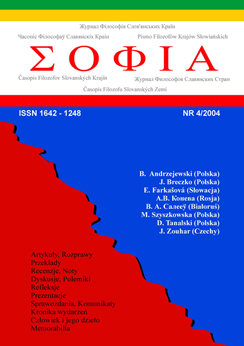
The Conspiracy Revealed
Spisek odtajemniczony
Book Review: Lech Zdybel, Idea spisku i teorie spiskowe w świetle analiz krytycznych i badań historycznych, Wydawnictwo UMCS, Lublin 2002, ss. 602
More...
Book Review: Lech Zdybel, Idea spisku i teorie spiskowe w świetle analiz krytycznych i badań historycznych, Wydawnictwo UMCS, Lublin 2002, ss. 602
More...
The Round Table of The Philosophers of Slav Countries (30 V 2003)
More...
The Round Table of The Philosophers of Slav Countries (30 V 2003)
More...

Keywords: Translation from Polish into English - Aleksy Mołczanow
More...

The aim of this essay is to give some indication of the practical, sometimes even pragmatic character of Polish thought, ever since its beginnings in the Middle Ages. However, we will endevour to substantiate that Polish philosophy differs from radical practicality, especially from its pragmatic version. Rejecting, as we are going to show, extreme (most frequently, German) rationalism, it did not accept without reservations the postulates of British-American philosophy either. Resting its hierarchy of values on the practical criterion, Polish philosophy did not get lost in an uncritical way in pragmatic relativism and subjectivism. Since the 19th century it exercised, in a conscious and studied way, its own specific character, whose crowning achievement was "Polish humanism", the marking method of which was that of "theoria cum praxi". The argument will be substantiated using the examples of selected and shortly presented personalities and moments of Polish philosophy, from the Middle Ages to the 2th century.
More...
Polemics about Values of United Europe
More...


Keywords: Translation from Polish into Slovak - Jana Udičová
More...
The history of mankind is divided into two periods. The first period is that of the culture of love and killing. The second period is the period of the culture of love. Since times immemorial human culture exerts proscriptions of killing and prescriptions of love. Ever since then, however, we have been killing incessantly, furnishing this killing with lofty substantiations. Here they are: killing in necessary self-defense, killing arising from the "nature" (physical and social) of man, killing in the name of justice, killing in the name of freedom, equality, brotherhood and democracy, terrorist killing, killing for punishment, killing in the name of virtue and for immortality, mission killing, killing for love (caritas, pietas and amor), killing in sacrifice, martyrdom killing. In the perspective of these substantiations, killing acquires the highest value, mutually implemented by both the one who is killing and the one who is being killed. We are constantly and continuously in the first period. The second period does not exist.
More...
Book Review: Stanisław Kowalczyk, Filozofia Boga, Wydawnictwo KUL, Lublin 2001 , ss. 352
More...
Book Review: Sabina Tolnaiová a Slavomír Gálik (ed.), Zbornfk, Človek, kultúra, hodnoty Vydavatel'stvo IRIS, Bratislava 2002
More...
The Round Table of The Philosophers of Slav Countries (30 V 2003)
More...
The text focuses on one specyfic aspeet of contemporary Slovenian and Polish political construction of reality: their religious-national mythologies. Both nations are paleed in "Latin (or Catholie) religio-cultural pattern", therefore some common characteristic can be observed, but on the other side also considerable differenees. In first part of the text some theoretical considerations - like the definition of "Christoslavism" - are presented, and after this the complex background of its historical formation among Slovenes and Poles is discussed. In the second part of the text, this Christoslavic structure and mythological features of Slovenian and Polish religious -national mythologies are analysed: the "immanent Catholicism" of both nations, religious differences with the neighbours, religious-national messianism, mythic interpretation of historic events, demonisation of the adversaries, strong popular devotion to the Roly Virgin; and folk religiosity. In the conclusion, some main similarities as well as differences between the two religious-national mythologies are summarized.
More...
As the basic principle of action, the ethical position of Bolesław Józef Gawecki known as perfectionism recognizes the strive for the ideal of moral perfection. Perfectionism, as an ethical doctrine, remains in harmony with the general character of the philosophy of development. Perfectionism is based on the notions of virtues and their assessment, values, norms, progress, and inner order. The type of being to which as an ideal the man should strive is the synthesis of geniality and sanctity. Man's portliness is based on the consciousness of this ideal.
More...
The Round Table of The Philosophers of Slav Countries (30 V 2003)
More...
Book Review: Zbyszka Melosik, Kryzys męskości w kulturze współczesnej, Wydawnictwo Wolumin, Poznań 2002, ss. 200
More...
Keywords: Translation from Polish into Ukrainian - Natalia Derewińska
More...